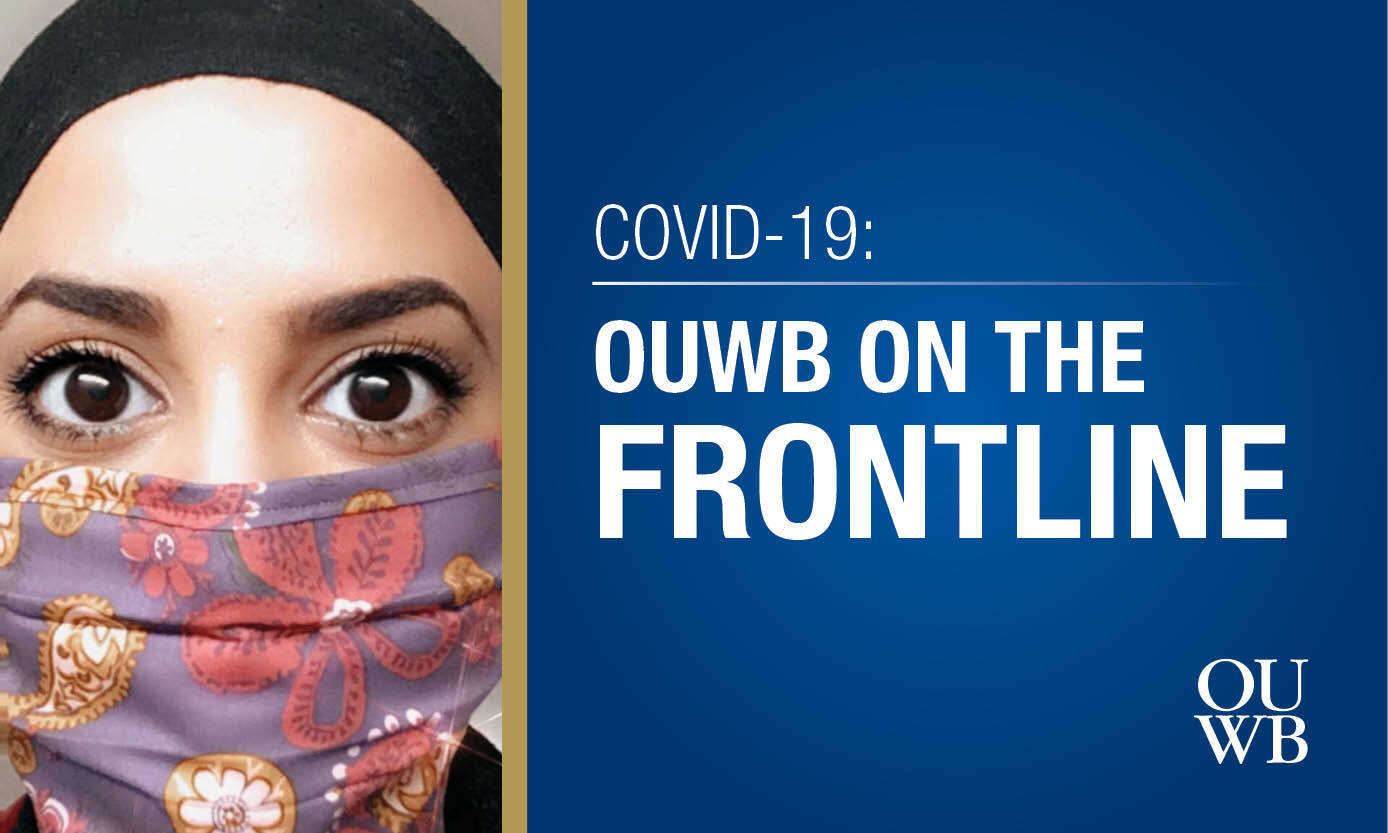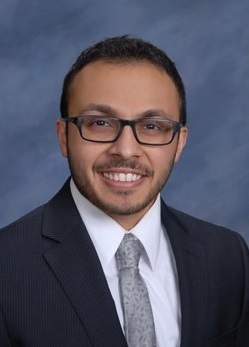
Third-year Oakland University William Beaumont School of Medicine medical student Niki Khajeh recalls exactly when she knew that the novel coronavirus COVID-19 would be devastating.
It was in one of the break rooms at Beaumont Hospital — where Khajeh was on an OB-GYN rotation — when she witnessed “a physician on the verge of tears,” and the doctor’s face lined with marks from wearing a mask for so long.
That was early March, well before the number of COVID-19 cases surpassed the 21,000-mark (according to state numbers as of April 9).
“It just kind of made me realize that ‘Oh, this isn’t even the worst of it...it’s going to get worse than this and it was kind of frightening to watch,’” Khajeh said.
Khajeh is among many with a connection to OUWB to have spent time on the frontline in the battle against COVID-19.
Some — current medical students like Khajeh, for example — were on the frontline in what we now know as the beginning of the outbreak in the U.S. For safety reasons, medical students were removed from clinical settings weeks ago (though many have found other ways to help the community).
Concurrently, OUWB alumni and faculty members remain in the heat of the battle. Many are taking to social media or simply sharing their stories to provide greater understanding of what it’s like, often using terms like “tense” and “stressful.”
Among them is Ryan Fringer, M.D., associate dean for Graduate Medical Education, OUWB, and director of Graduate Medical Education for Beaumont Health – Royal Oak, Troy and Grosse Pointe.
He said it “really is quite staggering to see how this illness is impacting our patient population.”
“No one has seen anything like this and I think that we have to understand that just being in a situation that is a first-time situation for all of us is going to be extraordinarily difficult,” he said.
“But we will get through this,” said Fringer. “This will not go on at this level of acuity forever...we have to keep that in mind.”
‘An intense time’
Fringer | |
Fringer |
Fringer said patients diagnosed with COVID-19 can generally be described as “extraordinarily sick...especially those with underlying chronic illnesses.”
“From the medicine side of things — what needs to be done, what we need to monitor, what needs to be ordered — things have almost become formulaic,” he said.
The difficult conversations — many involving end-of-life decisions and held via phone with family members — represent the toughest part of the job, he said.
“It’s the softer side, or the art, of what we do that is really taking up most of the time and emotional energy of the residents and staff,” said Fringer.
That’s something to which Alex DeMare, M.D., OUWB Class of 2015, can attest.
DeMare is a fifth-year general surgery resident at Beaumont Hospital, Royal Oak. To help with the influx of COVID-19 patients, he’s been working as part of an ICU team.
“Typically, most of our surgical patients don’t have terminal illnesses they can’t recover from,” he said. “We’re getting used to seeing a lot of people die, which is tough.”
Jay Brahmbhatt, M.D., OUWB Class of 2017, shared a story of just how tough it can be in a piece called “Hold on to humanity while we still can” that he wrote for KevinMD.com.
Brahmbhatt currently is an internal medicine resident for University of Washington Affiliated Hospitals in Seattle — one of the regions in the U.S. hardest hit by COVID-19.
He detailed how, while working in an ICU, he was asked to evaluate an 80-year-old Vietnamese woman, admitted to the acute care service with her husband with COVID-19 and boarded in the same room.
Brahmbhatt | |
Brahmbhatt |
“I laid out the scenarios: intubation versus no intubation, resuscitation versus no resuscitation, transfer to the ICU versus remaining on the acute care service. Yes, she could continue care in the same room as her husband, though the hypoxemia would worsen and lead to death. Alternatively, she could be transferred to the ICU, a different room, unconscious, and intubated. I expressed my doubt that she would be extubated or see her husband again.
“I was eventually able to pose the question in a way to best elicit his preference. He finally told me, if he were forced to choose, he would rather his wife stay in the same room as him. His wife woke up to hear that statement.
"The circularity of my discussion ceased; the tone became straightforward, pointed. She looked at me, suddenly her eyes bright with clarity. I asked her if she wanted a breathing tube to treat her illness; she nodded no. I asked if she wanted to stay with her husband, she nodded yes. She asked me if she could see her son. I told her I was not sure if it was allowed, I apologized. She thanked me anyways. The recompense was in navigating the decision.”
Other OUWB alumni have shared details on what it’s like to be in the hospital setting today.
Andrew Koo, M.D., OUWB Class of 2016 and also a resident a Beaumont Hospital, Royal Oak, shared details on some of the changes he’s witnessed within the hospital setting.
“It’s odd to be in the (hospital) setting when there’s no visitors, everybody’s wearing masks, every entrance is a sort of screening site...it’s just a very odd time to be a doctor,” said Koo. “It’s also a very intense time...a lot of people are scared of what’s going on.”
Amanda Xi, M.D., OUWB Class of 2015, echoed similar sentiments in an Instagram post. Xi is currently in a one-year critical care fellowship at Massachusetts General Hospital in Boston.
“I am at a loss for words,” she wrote. “I am worried about my family and friends. I am worried about how the future will look — things have been changing rapidly hour to hour.”
Jamilah Alhasidi, M.D., OUWB Class of 2019, and a family medicine resident at Beaumont Hospital, Troy, also took to Instagram to share her thoughts on what she called “a tough month.”
“But I am grateful for the opportunity to be able to give back however I can,” she wrote. “This is the job. I may not have signed up for a pandemic, but nobody did. I did sign up to help those who need it most and I will continue to do so.”
Rising to the challenge
Despite the difficulties brought on by COVID-19, Fringer, along with several others with connection to the OUWB family, say they have been generally impressed by the way health care workers have answered the call in such a time of need.
Fringer, who oversees the residency program at Beaumont Hospital, Royal Oak, has seen it firsthand through residents like DeMare who have been “repurposed and reassigned” from various specialties to care for COVID-19 patients.
“We’re essentially putting them on multi-disciplinary teams,” Fringer said. “And we’re finding these residents from all specialties are really rising to the challenge...(residents) are not only capable, but they’re interested, motivated, and volunteering to help out in different ways.”
DeMare said he’s seen his fellow residents step up countless times.
“Whenever we’re asked to do something, the answer has always been ‘Yes...yes, I can,’” he said. “Everyone has stepped up across the board and throughout the whole hospital.”
Koo said he’s been particularly struck by what he calls a “rally” by health care workers.
“Despite a lot of fear that everyone has revolving this disease, I have really seen people rally to this idea that we have this job to do,” Koo said. “I’ve watched a lot of people who have been able to come to work, put their fear aside, and say ‘How do I do my best today?’”
Gabriel Dominguez, M.D., OUWB Class of 2016, is an emergency medicine resident in central Florida (he did not want to identify the health system where he’s working).
“This thing is evolving really fast and it’s a huge privilege as an ER doctor to be there helping these patients,” he said. “Every day we discover new things, and it’s impressive to see how the medical community comes together to help each other out.”
Dominguez said it’s not just the physicians he’s working with in Florida, either.
“I’m in contact with my friends and colleagues from medical school at OUWB and we help each other out,” he said. “We still have that camaraderie, and it’s really amazing to be honest with you.”
For more information, contact Andrew Dietderich, marketing writer, OUWB, at adietderich@oakland.edu.
Follow OUWB on Facebook, Twitter, and Instagram.
NOTICE: Except where otherwise noted, all articles are published under a Creative Commons Attribution 3.0 license. You are free to copy, distribute, adapt, transmit, or make commercial use of this work as long as you attribute Oakland University William Beaumont School of Medicine as the original creator and include a link to this article.
.jpg)


